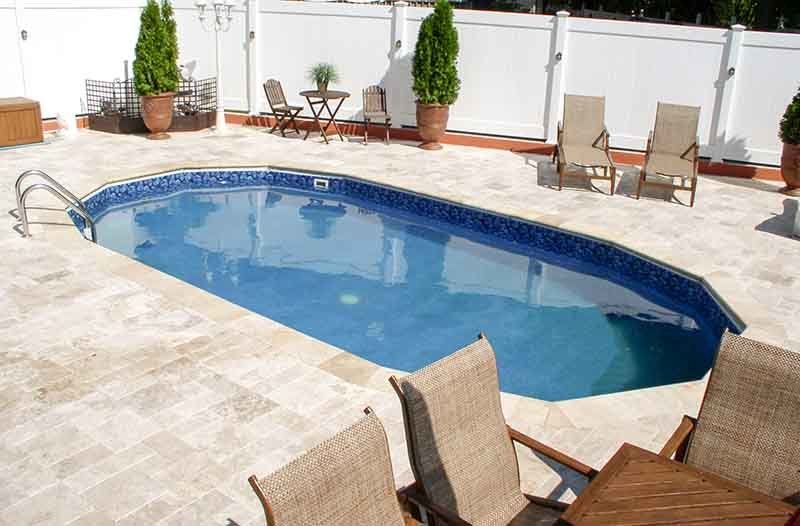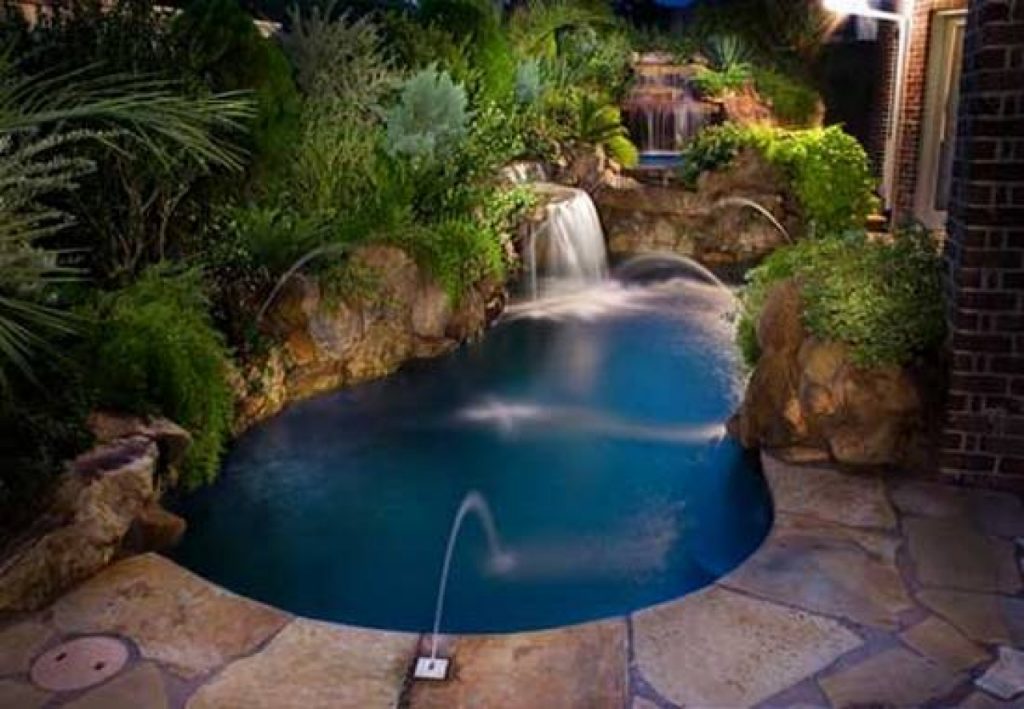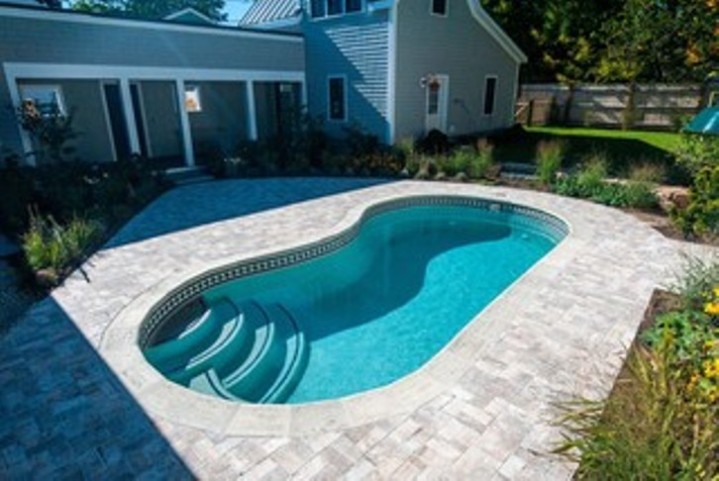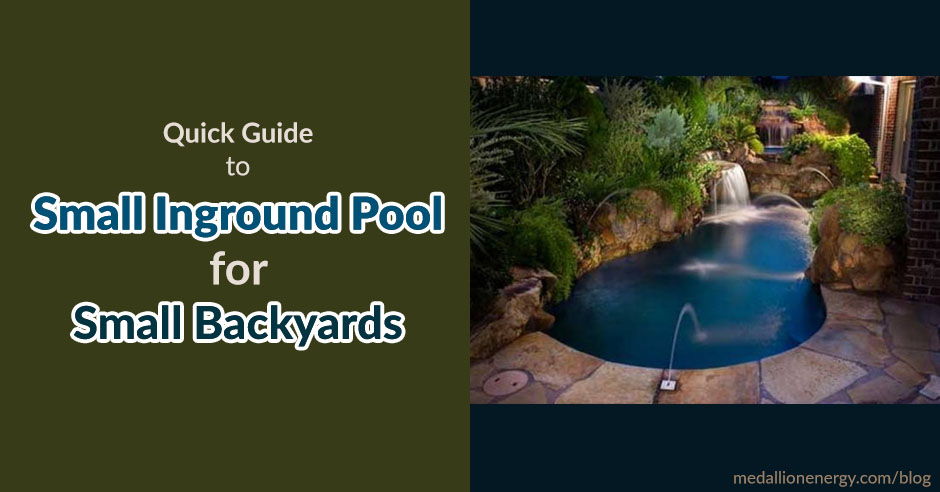If you have a small backyard, then you might think that installing a swimming pool is out of the picture. But having limited space doesn’t have to be a restriction.
There are plenty of small pool designs made to accommodate your situation. Because pool builders know that plenty of Americans want small inground pools – even if the backyard itself is small too.
Installing a small inground pool brings your backyard to life. It adds visual appeal and unmatched convenience, offering the perfect outlet for exercise and relaxation. And if you’re thinking about adding a small pool to your home, you’ve stumbled across the right page.
In this post, we go over everything you need to know about small inground pools, from size, cost, and style, to maintenance, heating, and more.
Quick Guide To Small Inground Pools For Small Backyards
Types of pools for small backyards



The type of pool you choose affects your pool ownership experience in a major way. Certain pools allow for more freedom when it comes to design, while others require less maintenance and care. It all depends on the material they’re made from.
Fiberglass
Fiberglass pools are known for their durability and low maintenance needs.
- Last the longest
- Require the least upkeep
- Less cleaning required
- Mid-range cost ($45,000-$85,000)
Concrete
Concrete pools offer the most flexibility when it comes to design and spacing needs.
- Increase property value
- Needs upkeep: replastering, acid washes
- Requires the most cleaning
- Most expensive to install ($50,000-$100,000)
Vinyl
Vinyl pools are lower maintenance than concrete, and cheaper to install
- Last long, but need vinyl replacement every 10 years
- Less maintenance than concrete
- Regular cleaning required
- Least expensive pool ($35,000-$50,000)
Related: Fiberglass vs Vinyl vs Concrete Pools: Pros and Cons
Small inground pool styles



Pools come in a variety of shapes. But to keep things simple, there are only two small inground pool styles you need to know about.
Linear pools are the traditional rectangular pools
Freeform pools comprise everything else (oval, amoeba, and curvy shaped pools are all freeform)
When choosing between a linear or freeform design for your small inground pool, remember this:
- Linear pools give you the most pool for your dollar and take up the most space
- Freeform pools allow for more deck space around the pool, due to their space-saving designs
Cost of small inground pools
The cost of a small inground swimming pool depends on two main factors:
The size of the pool, and the material used to build it.
As you already know, fiberglass and vinyl are the most affordable. So from there, it comes down to the size of the pool.
A small pool will always be more affordable than a big pool. That’s a given. But what about the pricing range?
Here are cost estimates for each type of pool, ranging from 18-26 foot pools:
- Small concrete inground pools
- Cost: $32,000 – $40,000
- Small fiberglass inground pools
- Cost: $28,000 – $36,000
- Small vinyl inground pool
- Cost: $14,000 – $22,000



Advantages of small inground pool
Aside from taking up minimal space in your backyard, small inground pools also come with a few other advantages.
Easy and affordable heating
What takes longer to heat up: A gallon of water, or a cup of water?
Easily the cup, right?
Now imagine that as the difference in water volume between a normal size pool (26+ feet) and a small inground pool.
Having less water to heat means two things:
- It takes WAY less time to warm up a small inground pool (faster heating)
- And it takes WAY less energy to keep it warm (lower heating bills)
And here’s another benefit. Since you save so much money by choosing a smaller pool, you can easily extend your swim season and put the savings towards a reliable pool heater.
If you swim occasionally and don’t mind sticking to the sunnier days for recreation, a solar heater could be a good choice.
But if you want on-demand heat regardless of the weather or chilly temperatures, a pool heat pump is the way to go. Heat pumps offer the most energy efficient operation of any pool heater (next to solar heaters) and cost less than $100 a month on average. Plus, some units can cool down your water too – a valuable feature for those blazing hot summer days.
Less maintenance
Here’s all the good stuff about small pool maintenance:
- Less water to skim
- Smaller walls to scrub
- Less water to filter
- Smaller floor to vacuum
- Lower chemical demand
If you remember from earlier, certain types of pools also offer unique advantages over others. For example, fiberglass pools require the least physical maintenance overall, due to their gel coated surfaces that repel buildup.
Related: 12 DIY Pool Cleaning and Maintenance Tips
More affordable to run
Having a small inground pool means there’s less water to run through the pump. Less water to heat. And of course, less water to chemically treat.
You put those three facts together, and you get major savings. Savings towards the biggest expenses of pool ownership.
So if you want a pool, but have a tight monthly budget, a small inground pool can be the perfect solution.
Costs less
Smaller pools cost less to install, less to maintain, and less to care for. Need we say more?
Disadvantages of small inground pools
It’s clear that owning a small inground pool is advantageous. But, to ignore their biggest shortcomings would be misleading. So let’s take a quick look at the disadvantages of small inground pools.
Less space for swimming
Naturally, a smaller pool means less room for swimming. And having limited swimming space limits the activities you can do in the pool. So while you might not be able to swim long distance laps, you’ll have plenty of room to cool off with a game of Marco Polo.
Less room for diving
Due to their length and width constrictions, small inground pools are usually much shallower than regular pools. While a regular pool may have depths ranging from 4-10 feet, a small inground pool might be 6 feet at it’s deepest point.
Closing thoughts on small inground pools
If you have a small backyard, then a small inground pool can be the solution you need. It comes with all the benefits of a regular pool, but with a much smaller price tag, lower monthly costs, and overall, less to worry about. So don’t let a lack of space prevent you from making a great investment in your health, and your life.
If you liked this post, you might also like:
20 Benefits of Owning a Swimming Pool


